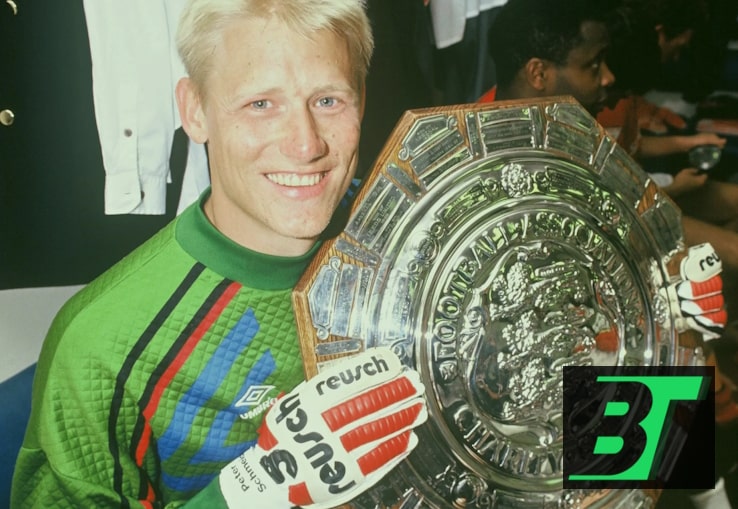
An extensive look at Peter Schmeichel, the commanding Danish goalkeeper who redefined the position and became a legend at Manchester United and beyond.
Peter Schmeichel was born in Gladsaxe, Denmark, in 1963. From an early age, he showed athletic promise, playing multiple sports before fully committing to football. His path to becoming a goalkeeper was not conventional; he started his career as an outfield player, which later contributed to his impressive footwork and distribution. Schmeichel developed through local clubs before joining Brøndby IF, where he quickly became one of the most dominant goalkeepers in Scandinavian football. His physical presence, confidence, and shot-stopping ability made him stand out long before the world knew his name.
During his years at Brøndby, Schmeichel helped the club earn several Danish league titles and strong European performances. His displays in the UEFA Cup attracted interest from major clubs outside Denmark. By the early 1990s, he was widely regarded as one of the most exciting goalkeeping talents in Europe. His reach, reactions, and unique star-jump technique made him extremely difficult to beat in one-on-one situations. Scouts recognized that Schmeichel possessed a rare combination of size, agility, and mentality that could thrive at the highest levels of the game.
In 1991, Sir Alex Ferguson signed Schmeichel for Manchester United in what was later described as one of the greatest transfer bargains in football history. Schmeichel immediately became the backbone of the team. His communication, leadership, and match-saving interventions transformed United’s defense. Over the decade that followed, he won multiple Premier League titles, FA Cups, and, most famously, the UEFA Champions League in 1999 as part of the treble-winning team. His performance in the Champions League final against Bayern Munich, where he made crucial saves and inspired the last-minute comeback, cemented his place among football’s finest goalkeepers.
Schmeichel’s international career reached its peak at the 1992 UEFA European Championship. Denmark, initially not even qualified for the tournament, entered as a last-minute replacement and shocked the world by winning it. Schmeichel was monumental throughout the competition, producing world-class saves and commanding the penalty area with authority. His performance in the semifinal shootout against the Netherlands, where he stopped Marco van Basten’s penalty, remains one of his most iconic moments. This triumph made him a national hero and one of the most respected goalkeepers in international football.
After leaving Manchester United in 1999, Schmeichel continued his career with Sporting CP in Portugal, winning the league title there as well. He later returned to England, playing for Aston Villa and eventually Manchester City before retiring. Even in the final years of his career, he displayed the same hunger, professionalism, and presence that defined his time at Old Trafford. His post-retirement work included media roles, ambassadorial duties, and support for football development in Denmark. His influence also lived on through his son, Kasper Schmeichel, who became a top-level goalkeeper.
Peter Schmeichel revolutionized the goalkeeping position. His aggressive approach, willingness to command his box, and ability to intimidate opponents set new standards. The star-jump technique he used, borrowed from handball, allowed him to cover large areas of the goal in close-range situations. He was also one of the early modern goalkeepers to act as an extra defender, using his passing and reflexes to initiate counterattacks. Schmeichel was not just a shot-stopper; he was a leader who shaped the mentality of every defense he worked with.
Peter Schmeichel’s career stands as a testament to determination, leadership, and excellence. From the pitches of Denmark to the biggest stages of world football, he brought authority and confidence to every team he represented. His impact on Manchester United’s golden era, Denmark’s Euro 1992 victory, and the evolution of modern goalkeeping remains unmatched. Today, he is remembered not only as one of the greatest goalkeepers of all time but as an iconic figure whose legacy continues to inspire generations.